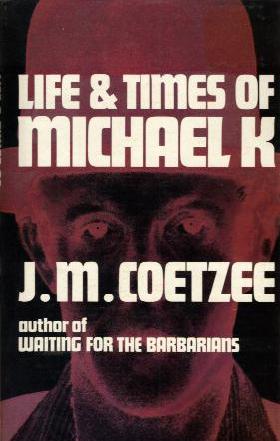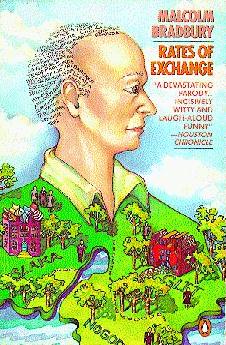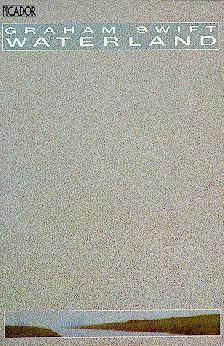
J.M. Coetzee
The following novels constitute the shortlist for the 1983 Booker Prize:
Notable Omissions from the 1983 Shortlist

|
Life and Times of Michael K. J.M. Coetzee |
Dustjacket synopsis:
"In a South Africa whose civil administration is collapsing under the pressure of years of
civil strife, an obscure young gardener named Michael K decides to take his mother on a long
march away from the guns towards a new life in the abandoned countryside.
"Everywhere he goes, however, the war follows him. Tracked down and locked up as a collaborator with the rural guerrillas, he embarks on a fast that angers, baffles, and finally awes his captors.
"The story of Michael K is the story of a man caught up in a war beyond his understanding, but determined to live his life, however minimally, on his own terms.
"J.M. Coetzee has produced another terrifying masterpiece: like Michael K he has the astonishing power to make the wilderness bloom."
Quotes:
"It is an astonishing book: lucid, graphic, sensitive, never overblown...It is written
without obvious anger but clearly with passion. It will go on haunting me." - Anthony Thwaite Observer
"A beautiful, spare, observant prose." - Claire Tomalin, Sunday Times
First Paragraph:
The first thing the midwife noticed about Michael K when she helped him out of his mother into the world was that he had a hare lip. The lip curled like a snail's foot, the left nostril gaped. Obscuring the child for a moment from its mother, she prodded open the tiny bud of a mouth and was thankful to find the palate whole.
To the mother she said: 'You should be happy, they bring luck to the household.' But from the first Anna K did not like the mouth that would not close and the living pink flesh it bared to her. She shivered to think of what had been growing in her all these months. The child could not suck from the breast and cried with hunger. She tried a bottle; when it could not suck from the bottle she fed it with a teaspoon, fretting with impatience when it coughed and spluttered and cried.
From the Deeker & Warburg hardback edition, 1983.

|
Rates of Exchange Malcolm Bradbury |
Dustjacket synopsis:
"At first glance Dr Angus Petworth (also called Pitwit, Pervert, and Petwurt by his Soviet-bloc
hosts) might appear stuffy; his is a pale-faced, middle-aged British professor of linguistic.
But as soon as he sets out on a lecture tour behind the Iron Curtain and becomes embroiled
in a confrontation with a matronly stewardess on the plane, it's clear that he is off on a
highly unusual adventure. As Petworth makes his rounds of universities and after-hours vodka
parties, weaving his way through a labyrinth of confusion, anxiety, and highly unlikely
romance, Malcolm Bradbury paints a hilarious portrait of the true meaning of 'cultural
exchange'."
Quotes:
"A devasting parody...incisively witty and laugh-aloud funny" - Houston Chronicle
"A feat of imaginative originality that ought to make every one of the dozens of novels
about Upper West Side divorces and male mid-life crises blush for shame" - The Nation
"A superb and substantial comic novel with urgent points to make about politics, love, and
ambition as perceived by East and West" - Los Angeles Times
"One of the most exciting, original, worthwhile novels to appear" - The New York Times Book Review
First Paragraph:
If you should ever happen to make the trip to Slaka, that fine flower of middle European cities, capital of commerce and art, wide streets and gipsy music, then, whatever else you plan to do there, do not, as the travel texts say, neglect to visit the Cathedral of Saint Valdopin: a little outside town, at the end of the tramway-route, near to the power station, down by the slow, marshy, mosquito-breeding waters of the great River Niyt.
From the Penguin paperback edition, 1985.

|
Flying to Nowhere John Fuller |
Dustjacket synopsis:
"Flying to Nowhere is set on a Welsh island with monastery, farm and miraculous well.
Novices nurse hopeless spiritual aspirations; farm girls in their dormitory after harvest
exchange tales of sexuality and flight. The Abbot is at his dissecting table, engaged in a
desperate and macabre search for the seat of the soul; the Bishop's emissary, investigating
missing pilgrims, is digging up the island. On the morning after the ceremonial ordeal of a
novice, women approach the bedchamber carrying sharp knives and bowls of hot water. At the
climax of the story the Abbot preaches a sermon against flying.
"Devotees of John Fuller's poetry and those who are discovering him for the first time will delight in this his first novel, the extraordinary power of its prose and its intricate thematic parallels, just as they will be driven by an urgent interest in the story: what will Vane find? Will Geoffrey and Tetty escape? What exactly happens to the terrified novice? Has the Abbot discovered the secret of eternal life, or is he mad?
"Flying to Nowhere is a fable about everybody's feeling that the body is insufficient and that there ought to be the possibility of some sort of miraculous escape from it. Its strange ambience allows the reader to half-believe in the bizarre and affirmative event at the conclusion."
Quotes:
"A set of mysteries as enticing as any novel reader might wish" - Valentine Cunningham, Observer
"The shape-shifting nature of its plot, and a precision of language which serves to enhance
its mystery, are the chief pleasures of Flying to Nowhere." - Adam Mars-Jones, Sunday Times
First Paragraph:
The three novices walked fast down the margin of the hay field. In the great heat the tall grasses stood feathery and still, unti the striding sandalled feet parted and crushed them. The hems of the woollen robes caught the seed tips and dragged them. Stems bowed and sprang, sending out tiny clouds of grass fruit.
The garments of meditation are not designed for the pace of prologue: they walked swiftly, though without urgency. At each step their garments were caught between their legs, tugging and chafing their calves. The robed arms were folded, as if to imply ceremony in some decisive preamble.
From the Penguin paperback edition, 1983.
Notes:
This novel was awarded the Whitbread Best First Novel Award in 1983.

|
The Illusionist Anita Mason |
Dustjacket synopsis:
"In an age in which the advent of the Deliverer was eagerly awaited, Simon Magus walked the Earth
and its oceans - and flew above both.
"Simon Magus: idolator, sorcerer, seducer, necromancer, outcast and illusionist. The man who could conjure wild lions, writhing serpents, dazzling birds, pleasure gardens and shining palaces out of thin desert air. The master of the golden handiwork of ancient magic, the man with the powers of a god bound in a hungry body driven by lust and pride. Was he the Deliverer? Or had the Deliverer already died, broken on a cross at Calvary, misunderstood and forgotten by all except a sect of unlettered peasants?
"Something threatens the cold fire of Simon's domination. As his powers grow the new religion grows also. At its heart is a creed too simple for Simon's intellect: a mystery without illusions. Between light and darkness the illusionist and the new believers must fight."
Quotes:
"THE ILLUSIONIST is about Simon Magus: necromancer, sorcerer of Samaria, inspriation of the
Faust legend. About magic, miracles, and the difference between the two.
Plausible...vivid...fine." - The Times
"Unusual...inspired...rich and colourful fiction." - Sunday Times
First Paragraph:
The man stood on a rooftop and faced the rising sun.
'First beginning of my beginning...'
He spoke quietly as if to himself.
'First source of my source, spirit's spirit, fire...'
His linen sleeves fluttered lightly in the wind blowing in from the Great Sea.
'Perfect body of me, moulded by a hand incorruptible in a world devoid of light...'
The crowd jostled and pointed in the street below. He was not aware of them. He was entirely
focused in his will. His voice, no longer consciously directed by him, rose in a chant. He
chanted to the hawk of the sun.
'May it be right that I, though mortal born of mortal womb, shall in this flesh ascend, through
the strength of the immortal spirit in me, borne up by an almighty arm...'
The will, as it grew tauter, passed beyond supplication. His voice rang out in a challenge.
'For I am the Son, I surpass the limit of my souls, I am...'
He paused. Into the pure drop of silence he pronounced the name of God.
He stepped forward and upward, like a man ascending a staircase, but on air.
He flew.
From the Abacus paperback edition, 1983.

|
Shame Salman Rushdie |
Quotes:
"Salman Rushdie has earned the right to be called one of our great
storytellers" - Observer
"There can seldom have been so robust and baroque an incarnation of the political
novel as Shame. It can be read as a fable, polemic or excoriation; as history or
as fiction...This is the novel as myth and as satire" - Sunday Telegraph
"Shame is and is not about Pakistan, that invented, imaginary country, "a failure
of the dreaming mind"...The theme is shame and shamelessness, born from the violence
which is modern history. revelation and obscurity, affairs of honour, blushings of all parts,
the recession of erotic life, the open violence of public life, create the extraordinary
Rushdie mood...Rushdie shows us with what fantasy our sort of history must now be written -
that, that is, we are to penetrate it, and perhaps even save it" -
Malcolm Bradbury, Guardian
"Shame is every bit as good as Midnight's Children. It is a pitch-black
comedy of public life and historical imperatives" - The Times
First Paragraph:
In the remote border town of Q., which when seen from the air resembles nothing so much as an ill-proportioned dumb-bell, there once lived three lovely, and loving sisters. Their names...but their real names were never used, like the best household china, which was locked away after the night of their joint tragedy in a cupboard whose location was eventually forgotten, so that the great thousand-piece service from the Gardner potters in Tsarist Russia became a family myth in whose factuality they almost ceased to believe...the three sisters, I should state without further delay, bore the family name of Shakil, and were universally known (in descending order of age) as Chhunni, Munnee and Bunny.
And one day their father died.
From the Vintage paperback edition, 1995
Note:
This novel was also awarded the French Prix du Meilleur Livre Etranger.

|
Waterland Graham Swift |
Quotes:
"Graham Swift has mapped his Waterland like a new Wessex. The tale he tells is
at once a history of England, a Fenland documentary, and a fictional autobiography. The
strangeness and strange effects of 'a landscape which, of all landscapes, most
approximated to Nothing' are superbly done: Waterland appropriates the Fens as
Moby Dick did whaling or Wuthering Heights the moors. This is a beautiful,
serious and intelligent novel" - Hermoine Lee, The Observer
"Graham Swift's new novel, Waterland, is a revelation: a long, classically well
achieved, resonantly well written and very English novel of place, history and character.
Swift spins a tale of empire-building, land reclamation, brewers and sluice minders,
bewhiskered Victorian patriachs, insane and visionary relicts, an amazing panoply of
England over the last 300 years...I can't remember when I read a book of such strange,
insidious, unsettling power with a more startling cast of characters going about their
business as though it were utterly normal and preparing the way, down the centuries for a
trio of deaths." - Books and Bookmen
"...perfectly controlled, superbly written, and, as they used to say, rivetting.
Waterland is original, compelling and narration of the highest order." - The Guardian
"...positively Faulknerian in its concentration on murder, incest, guilt and insanity.
The brooding sense of place as a shaping force in the novel's action is as powerful and Hardy's
Wessex or Dickens's London." - Time Out
"Waterland is a quite brilliant novel, so good that whether Graham Swift wins the
Booker Prize or not is in a sense a matter of little consequence." - The Daily Telegraph
"...establishes Graham Swift as one of the most important talents to emerge in
English fiction" - The Glasgow Herald
"Swift takes on and refracts a varied tradition: the family saga, the business saga, the
novel of provincial life; in many and complex ways The Mill on the Floss lies
behind Waterland as a novel of practical family fortunes, social history and adolescent
love..Waterland has the air of a novel classically at ease in its chosen, and uniquely
particular, field of reference." - Times Literary Supplement
First Paragraph:
"And don't forget," my father would say, as if he expected me at any moment to up and leave to seek my fortune in the wide world, "whatever you learn about people, however bad they turn out, each one of them has a heart, and each one of them was once a tiny baby sucking his mother's milk..."
Fairy-tale words; fairy-tale advice. But we lived in a fairy-tale place. In a lock-keeper's cottage, by a river, in the middle of the Fens. Far away from the wide world. And my father, who was a superstitious man, liked to do things in such a way as to make them seem magical and occult. So he would always set his eel traps at night. Not because eel traps cannot be set by day, but because the mystery of the darkness appealed to him. And one night, in midsummer, in 1937, we went with him, Dick and I, to set traps near Stott's Bridge. It was hot and windless. When the traps had been set we lay back on the riverbank. Dick was fourteen and I was ten. The pumps were tump-tumping, as they do, incessantly, so that you scarcely notice them, all over the Fens, and frogs were croaking in the ditches. Up above, the sky swarmed with stars which seemed to multiply as we looked at them. And as we lay, Dad said: "Do you know what the stars are? They are the silver dust of God's blessing. They are little broken-off bits of heaven. God cast them down to fall on us. But when he saw how wicked we were, he changed his mind and ordered the stars to stop. Which is why they hang in the sky but seem as though at any time they might drop..."
From the Picador paperback edition, 1984.
Notes:
In 1992 Waterland was made into a film, directed by Stephen Gyllenhaal, and featuring
Jeremy Irons, Sinead Cusack and Ethan Hawke.
Notable Omissions from the Shortlist:
"Coming from Behind", Howard Jacobson
"Act of Darkness", Francis King
"Cold Heaven", Brian Moore
"Fools of Fortune", William Trevor
This page and its contents are copyright © 2002-05 by Perry Middlemiss, Melbourne, Victoria, Australia.
Last modified: August 17, 2005.